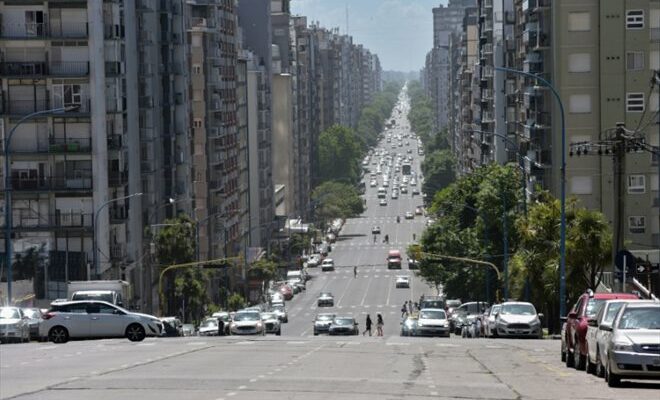Aerial view of the beach in Mar del Plata, Argentina, January 17, 2024 (AFP/MARA SOSTI)
They are fewer in number, count their pesos and go out, are in a bad mood: the annual summer migration of Argentines to the Atlantic beaches of Mar del Plata has the bitter taste of inflation of more than 200%, and austerity yet to come under the ultraliberal presidency of Javier Milei.
There are details that are unmistakable: on the beach, groups of children and adults play football matches on the golden-brown sand. Normally, it’s just impossible, due to lack of space between the tens of thousands of bathers crowded together for kilometers…
Whether you love it or hate its crowds, its noise, its night bars, “Mardel”, a holiday mecca 400 km south of Buenos Aires, normally receives, between Christmas and February, six times more tourists than its 650,000 inhabitants. This summer, with 60% occupancy past mid-January, the “season is lost”, local tourism stakeholders say in unison.
“Last summer, I did at least 30 trips a day. Now, I’m happy if I get to 15!,” grimaces Daniel Molina, Marplatense taxi, near the bus station where a long line of idle drivers wait for the customer. “Normally, we don’t move forward here. There, it’s dead.”
– “Sad” to count everything –
Inflation at 12.8% in November, 25.5% in December (211.4% over the year) and the final blow of a devaluation of more than 50% of the peso in mid-December in the first days of Milei government, got the better of purchasing power, and vacationers’ enthusiasm.

Attendance at beach restaurants is at half mast in Mar del Plata, Argentina, January 17, 2024 (AFP/MARA SOSTI)
Like that of Julian Groppo, a 26-year-old architect, faithful for years to “La Feliz” (nickname of Mar del Plata) but who this summer only stays five days, instead of 15 in 2023. And is tired of weighing the slightest expense.
“She’s a real bitch,” he moaned. “We should be calm on vacation, not worry. I’m not saying spend everything without limit, but not be constantly doing accounts. It makes me sad, in fact.”
Maria Aprile, a young designer from Buenos Aires, knows she is “very lucky to have been able to come”, sharing gasoline with three friends and not paying for accommodation “in my grandmother’s apartment”. “Otherwise it’s clear, I wasn’t coming.”
Because many have not been able to come, in a country where the minimum wage, at 156,000 pesos (180 dollars), is still awaiting a reevaluation since the beginning of December (it had then increased by +8.5%, outpaced by inflation) when the Round trip bus from Buenos Aires to Mar del Plata costs 80,000 pesos ($92) and a night in a mid-range hotel for two costs almost 50,000 pesos ($57).
Hotel industry, local notaries, report a lower occupancy rate of 20 to 30% than last year, but Valeria Pratto, 45-year-old real estate agent, assures that she has “not even rented a quarter” of property compared to the summer 2023.
Everyone at their own level measures the change, the figures, the mood. Like Jose Maria Mendiola, who rents small tents to shelter from the sun, in a club with a swimming pool on the beach: “barely 50 to 60% of tents” rented, he says.
– “Already another country” –
Like Guido Salvaterra, who migrates from the capital every summer to sell grilled corn, a classic taste of Marplatense beaches: “Last summer, a family bought me an ear (3,000 pesos, about $3.50) per person. Today ‘today, they share it…’

Light traffic during this period on Colon Avenue in Mar del Plata, Argentina, January 17, 2024 (AFP/MARA SOSTI)
Or Lola Coppo, a street seller of souvenirs, who despairs because “selling anything is difficult. People don’t have money, everything costs them. All they want is to come and spend a moment at the beach, and be able to afford to eat.”
In this summer of 2024, “the tourist is angry, he is complicated”, summarizes Paul Etcheverry, manager of a bathing establishment. “He comes for less time, he brings his own food and drinks, and doesn’t go to restaurants as much.”
The background music of Mar del Plata has also changed. Usually on the seafront “the speakers brought by the bathers spit out a mixture of music”, in a sometimes invasive competition of sounds, explains Luciano Rodrigo, VTC driver, noting… the silence.
“What we see is nothing more and nothing less than the crisis that Argentina is going through,” muses Jose Maria Mendiola. “Until two months ago, it was a country, and today it is is another,” he said in reference to the first economic impacts of the Milei government. Who predicted “several difficult months” for 2024.
© 2024 AFP
Did you like this article ? Share it with your friends using the buttons below.




